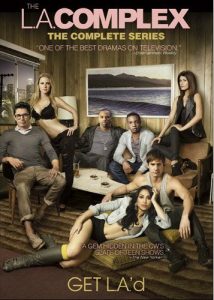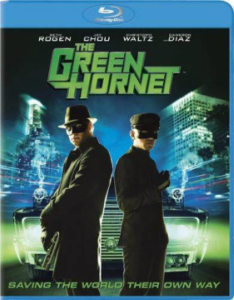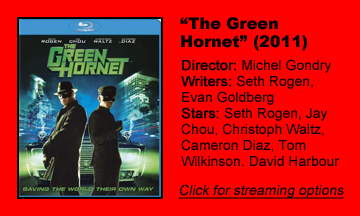My pal Michael likes to say that there’s nothing worse than a bad comedy, and “The Green Hornet” (2011) is a prime example. Flat and difficult to watch, Seth Rogen’s bid at being a superhero – yes, that’s how ubiquitous this genre was last decade – is the longest 119-minute movie you’ll ever watch.
It has a basic technical competence under the direction of Michel Gondry (“Eternal Sunshine of the Spotless Mind”) and the actors are dialed in, but nothing about the experience of watching this film is enjoyable.
Rogen not up to this task
When watching it, I felt bad for Rogen, because he gamely tries to give energy to the banter between Britt Reid/Green Hornet and sidekick Kato (Jay Chou). English is clearly not Chou’s primary language; I caught him peeking to the side for phonetic pronunciations at times.
Yet by default, Kato is the film’s best character; he projects an easy coolness, and the fact that he’s the “sidekick” is an intentional joke: He invents and creates all the duo’s weapons, and has slightly more leadership ability than Reid, who has none at all.
But when the closing credits mercifully rolled, I realized this mess partly is Rogen’s fault, because he wrote the screenplay, along with Evan Goldberg. This duo has done great work, including in the superhero genre, as TV’s “The Boys” – which they exec-produce — was a highlight of 2019. “Green Hornet,” though, is stunningly flat.
It’s a satire of crime films, but none of the observations are funny. Some of Reid’s heroic lines mimic the faux gravitas of George W. Trendle’s “Green Hornet” radio serials, which started in 1936. (The 1960s ABC TV series, featuring Bruce Lee as Kato, then further popularized the franchise.) I guess humor is subjective, but I find it lacking here.
Most of my sympathy is reserved for Oscar winner Christoph Waltz, who plays villain Chudnofsky, and Cameron Diaz, who plays Reid’s secretary, Lenore. Chudnofsky is defined by trying to be scary, so he does things like murder underlings and think up catchphrases and a new name – “Bloodnofsky.”
Lenore, for her part, fights off Reid’s rude sexual advances. Rich-and-spoiled Reid’s awkwardness with Lenore – possibly the first woman he likes who has rejected him — could be funny and cute, but his sexual harassment is not amusing, and not just through a post-#MeToo lens. “Green Hornet” makes a conscious choice to make its hero unlikeable, as Reid does not learn his lesson and apologize to Lenore.
Absurd portrayal of newspapers
“Green Hornet’s” portrayal of newspapers is absurd on many levels, but I’ve seen so many off-point fictional newspapers that it doesn’t bother me as much as other things in the film. Britt takes over the Los Angeles Daily Sentinel upon the death of his publisher/owner father, James (Tom Wilkinson, who escapes this mess early, as does Rogen’s fellow “Freaks and Geeks” veteran James Franco).

It’s well established that James doesn’t trust his son and only lives for the Sentinel, so why would he leave the publisher job to Britt? I can see him leaving an ownership stake to his son, but why the job?
No surprise, Britt goes on to use the newspaper in ways they are never used in reality (not without word getting out via anonymous staff to media watchdog sites like the Poynter Institute): He tells his staff what to put in the paper – specifically, every day. J. Jonah Jameson of “Spider-Man” does this, too, but he’s an editor, not a publisher.
The reason Britt wants his alter ego to get ink is … well, pick your description: complicated? Muddled? Stupid? The overarching goal of the Green Hornet and Kato is to fight crime in the city. In order to do that, they want to be seen as villains by the city’s true villains. This doesn’t make logical sense, and it certainly doesn’t pan out well for the duo.
Not bad enough to be good
I guess it goes toward the joke that the Hornet and Kato aren’t too bright, so they need Lenore to guide them on the right path. However, they never directly recruit Lenore; instead, Reid gives her secretarial research assignments at the Sentinel that will broadly help them.
“The Green Hornet” is bad, but not incompetent enough to be so bad it’s good; in fact, many viewers put it in the category of mediocre, which I think it could be if it wasn’t toned as a comedy. The action sequences, specifically how they showcase Kato’s tech such as the car door guns, are the least bad parts.
It doesn’t matter because viewers will be checked out by that point, numbed by the .000 comedic batting average, the self-centeredness of the titular hero and the fact that the sidekick actor is getting by on phonetic line readings.
This is easily the worst “Green” superhero film of 2011, and that’s no small achievement, as “Green Lantern” also came out that year.


